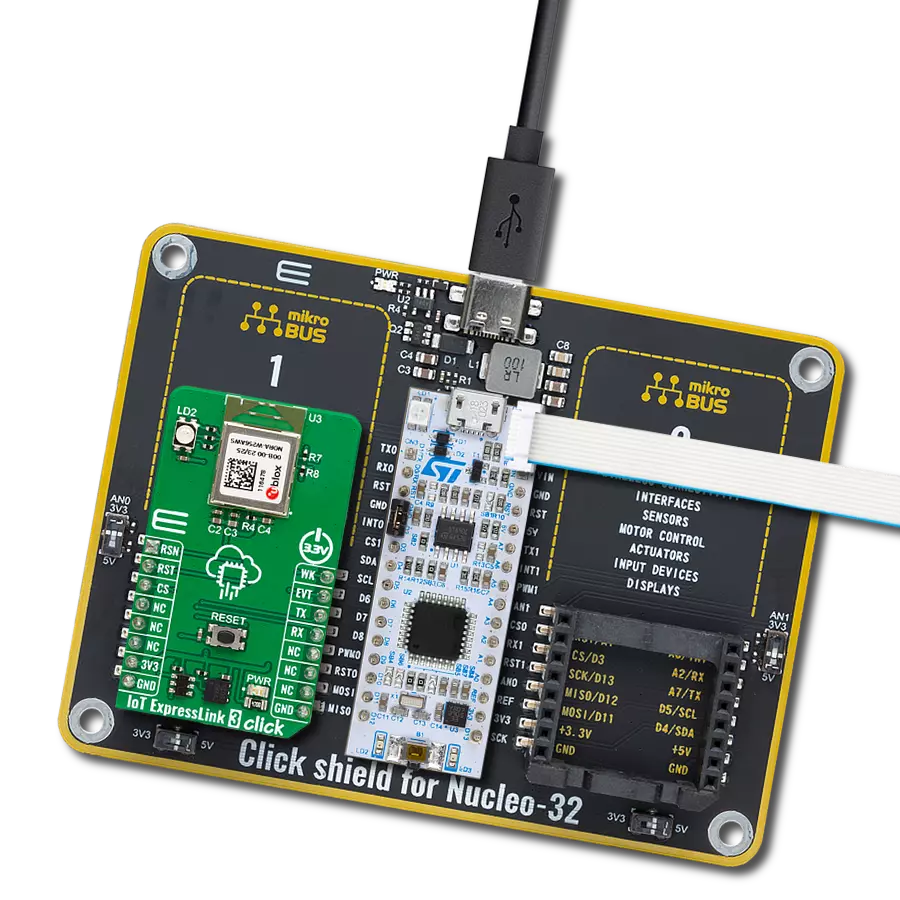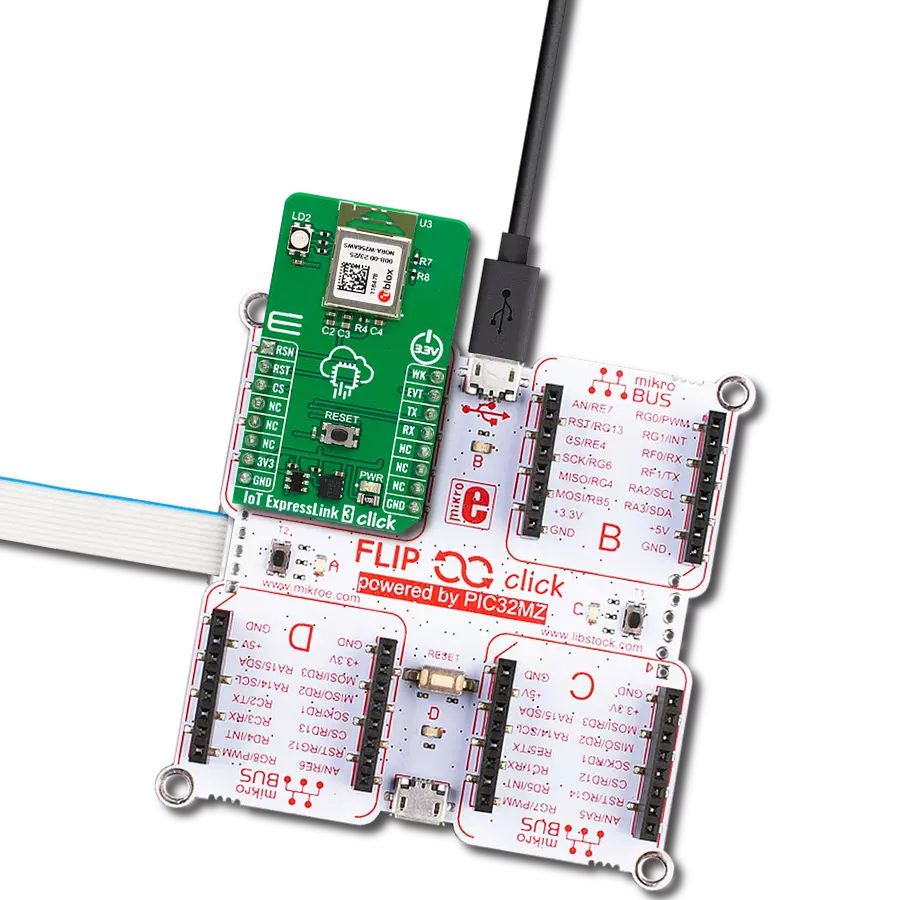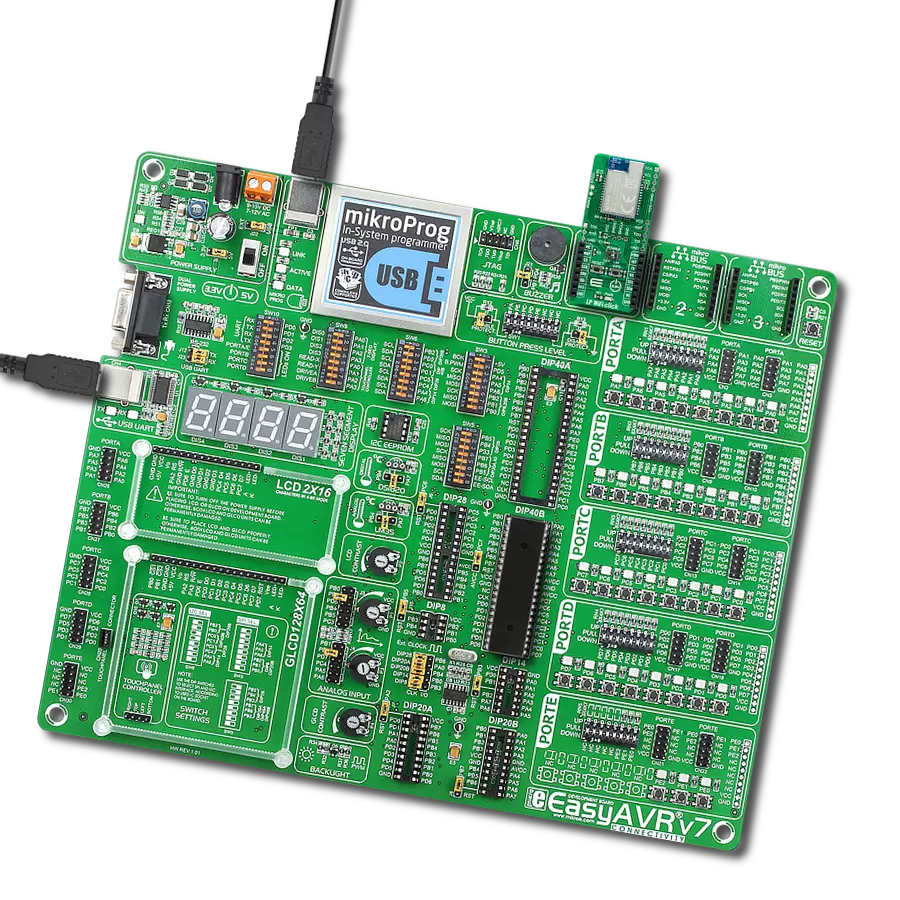将您的环境转变为智能绿洲,使用我们的 WiFi 模块,它能够轻松集成到您的项目中,为您的联网生活方式提供连接支持。
A
A
硬件概览
它是如何工作的?
WiFi ESP Click 基于 ESP-WROOM-02,这是来自 Espressif 的一款完全集成的 WiFi 模块。它采用了广为人知的工作马 ESP8266EX,这是一款高度集成的 SoC 解决方案,满足了行业对高效能源使用、紧凑设计和可靠性能的持续需求。除了 WiFi 功能外,ESP8266EX 还集成了 Tensilica 的 L106 Diamond 系列 32 位处理器的增强版和片上 SRAM,以及天线开关、RF balun、功率放大器、低噪声接收放大器、滤波器和电源管理模块。该模块还包括 2MB 的 SPI 闪存,用于存储用户程序。凭借完整和自成一体的 WiFi 网络功
能,它可以作为独立应用程序(WROOM 模块本身)或作为 MCU 主机的从属设备运行,这是 Click 板作为一个整体的主要意图。因此,这块 Click 板可以通过 UART 接口(mikroBUS 引脚插座上的 RX、TX 线)作为 WiFi 适配器应用于任何微控制器设计。WiFi ESP Click 配备了模块的 5 个 GPIO,这些 GPIO 是模块的 HSPI/GPIO 接口的一部分。GPIO0 通过与旁边的 GND 缩短来进入 ESP8266EX 的 UART 下载模式。这样,您可以升级模块的固件或上传自定义固件。WiFi ESP Click 通过 UART 接口与主 MCU 通信,
其默认通信协议为 115200 波特率。除了标准的 UART RX 和 TX 线外,主 MCU 还通过 EN 和 RST 线与 WiFi ESP Click 连接。前者在逻辑低电平时关闭模块,而后者用于重置 ESP8266EX。您还可以使用 UART 接口通过 AT 命令集与 ESP-WROOM-O2 模块进行通信。这个 Click 板™ 只能在 3.3V 逻辑电压水平下操作。在使用具有不同逻辑电平的 MCU 之前,板必须执行适当的逻辑电压水平转换。此外,它还配备了包含函数和示例代码的库,可以作为进一步开发的参考。
功能概述
开发板
Curiosity PIC32 MZ EF 开发板是一个完全集成的 32 位开发平台,特点是高性能的 PIC32MZ EF 系列(PIC32MZ2048EFM),该系列具有 2MB Flash、512KB RAM、集成的浮点单元(FPU)、加密加速器和出色的连接选项。它包括一个集成的程序员和调试器,无需额外硬件。用户可以通过 MIKROE
mikroBUS™ Click™ 适配器板扩展功能,通过 Microchip PHY 女儿板添加以太网连接功能,使用 Microchip 扩展板添加 WiFi 连接能力,并通过 Microchip 音频女儿板添加音频输入和输出功能。这些板完全集成到 PIC32 强大的软件框架 MPLAB Harmony 中,该框架提供了一个灵活且模块化的接口
来应用开发、一套丰富的互操作软件堆栈(TCP-IP、USB)和易于使用的功能。Curiosity PIC32 MZ EF 开发板提供了扩展能力,使其成为连接性、物联网和通用应用中快速原型设计的绝佳选择。
微控制器概述
MCU卡片 / MCU
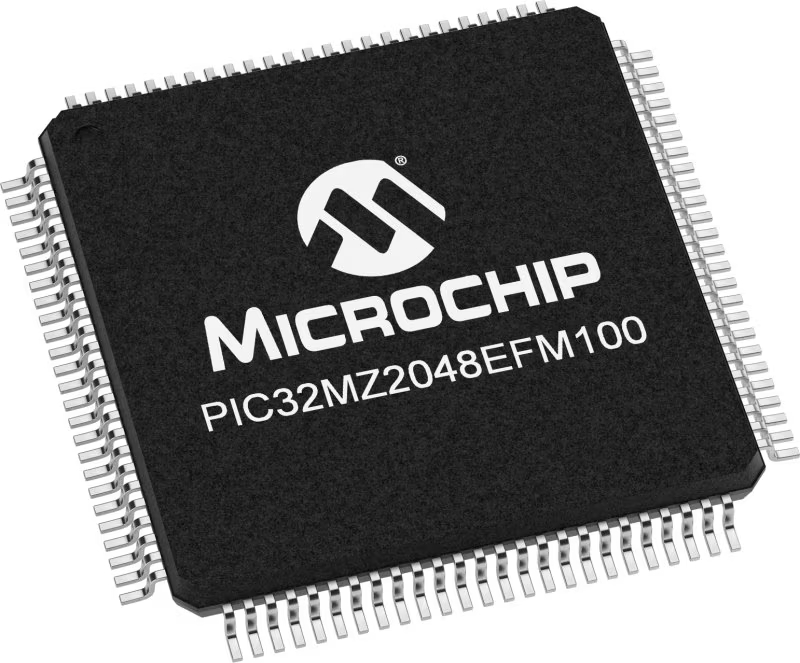
建筑
PIC32
MCU 内存 (KB)
2048
硅供应商
Microchip
引脚数
100
RAM (字节)
524288
使用的MCU引脚
mikroBUS™映射器
“仔细看看!”
Click board™ 原理图
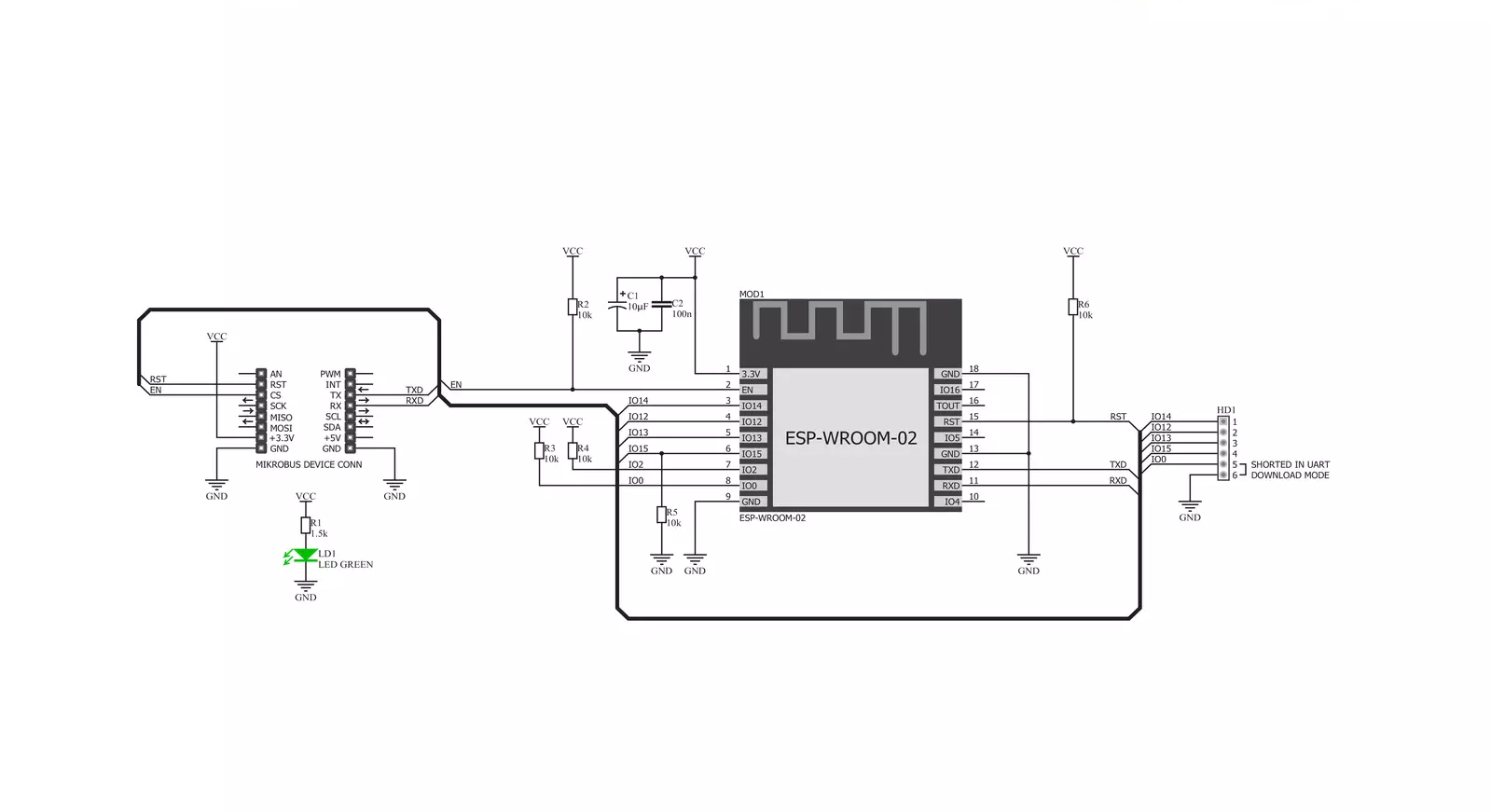
一步一步来
项目组装
实时跟踪您的结果
应用程序输出
1. 应用程序输出 - 在调试模式下,“应用程序输出”窗口支持实时数据监控,直接提供执行结果的可视化。请按照提供的教程正确配置环境,以确保数据正确显示。

2. UART 终端 - 使用UART Terminal通过USB to UART converter监视数据传输,实现Click board™与开发系统之间的直接通信。请根据项目需求配置波特率和其他串行设置,以确保正常运行。有关分步设置说明,请参考提供的教程。
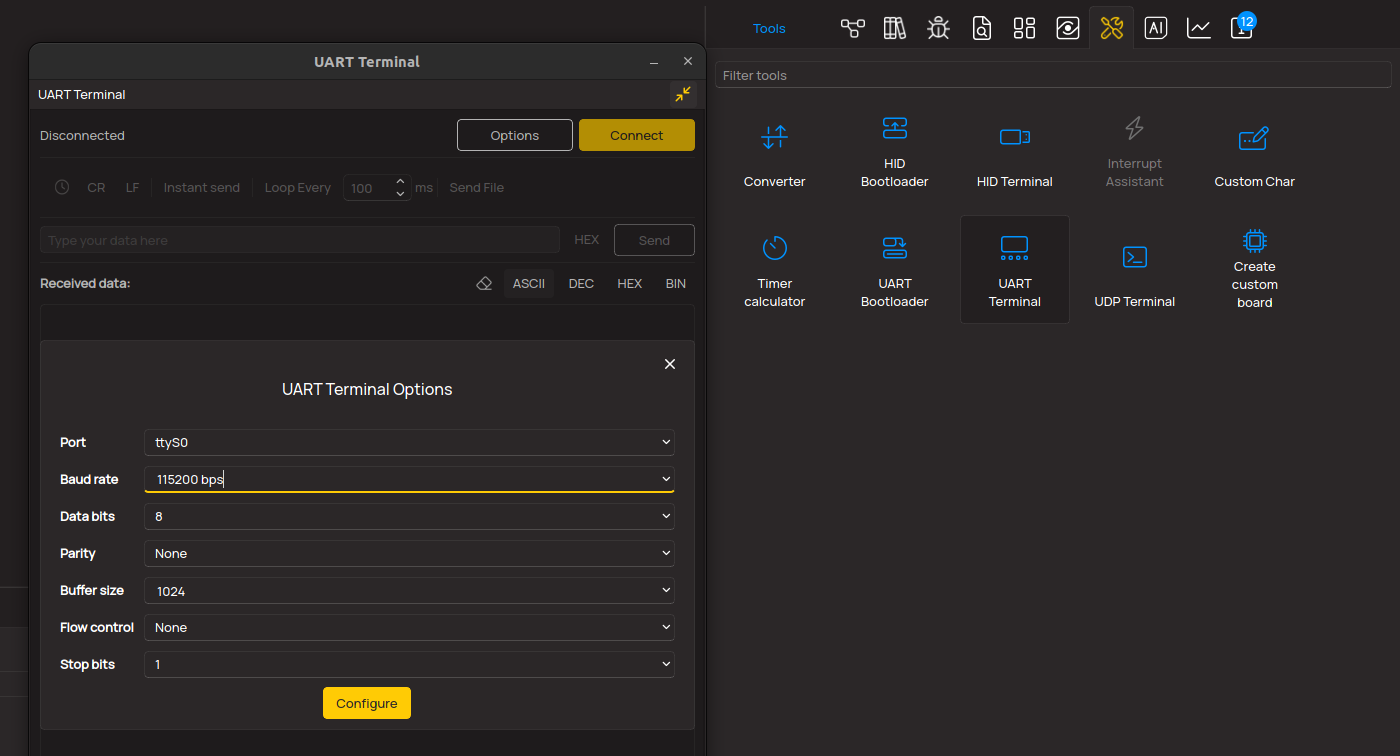
3. Plot 输出 - Plot功能提供了一种强大的方式来可视化实时传感器数据,使趋势分析、调试和多个数据点的对比变得更加直观。要正确设置,请按照提供的教程,其中包含使用Plot功能显示Click board™读数的分步示例。在代码中使用Plot功能时,请使用以下函数:plot(insert_graph_name, variable_name);。这是一个通用格式,用户需要将“insert_graph_name”替换为实际图表名称,并将“variable_name”替换为要显示的参数。
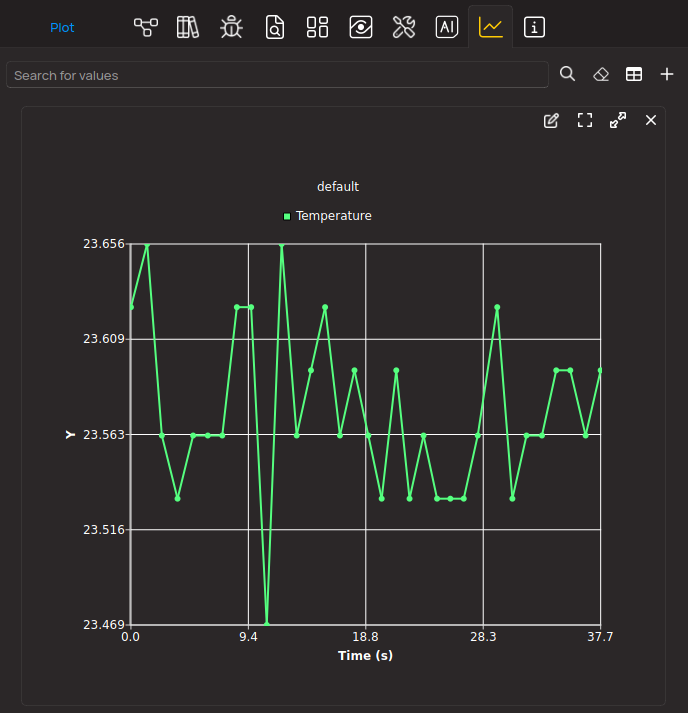
软件支持
库描述
这个库包含 WiFi ESP Click 驱动的 API。
关键功能:
wifiesp_send_cmd- 向模块发送 AT 命令。wifiesp_generic_write- 通用写入函数wifiesp_generic_read- 通用读取函数。
开源
代码示例
完整的应用程序代码和一个现成的项目可以通过NECTO Studio包管理器直接安装到NECTO Studio。 应用程序代码也可以在MIKROE的GitHub账户中找到。
/*!
* \file
* \brief wifiesp Click example
*
* # Description
* This example connects to the desired WiFi network and then
* creates web server on the IP address assigned to the click board.
* The user can connect to the server via web browser.
*
* The demo application is composed of two sections :
*
* ## Application Init
* Initializes driver and wifi communication, then connects to the desired WiFi network
* and creates web server on the IP address assigned to the click board.
*
* ## Application Task
* Waits for the client request (paste IP address in your web browser and
* refresh to send a request).
* The click board will respond by sending a page content to the client.
*
* \author MikroE Team
*
*/
// ------------------------------------------------------------------- INCLUDES
#include "board.h"
#include "log.h"
#include "wifiesp.h"
#include "string.h"
#include "conversions.h"
#define APP_SSID "MikroE Public"
#define APP_PASSWORD "mikroe.guest"
#define PROCESS_BUFFER_SIZE 610
// ------------------------------------------------------------------ VARIABLES
uint8_t page[ ] = "<a href=\"https://www.mikroe.com/\">MikroElektronika</a>\
<h1 style=\"color:red;\">WiFi ESP click board</h1>";
uint8_t page_len[ 10 ] = { 0 };
uint8_t send_buf[ 10 ] = { 0 };
static uint8_t link_id[ 2 ] = { 0 };
static wifiesp_t wifiesp;
static log_t logger;
static char app_buf[ PROCESS_BUFFER_SIZE ] = { 0 };
static int32_t app_buf_len = 0;
static err_t app_error_flag;
// ------------------------------------------------------- ADDITIONAL FUNCTIONS
static void wifiesp_clear_app_buf ( void )
{
memset( app_buf, 0, app_buf_len );
app_buf_len = 0;
}
static void wifiesp_log_app_buf ( void )
{
for ( int32_t buf_cnt = 0; buf_cnt < app_buf_len; buf_cnt++ )
{
log_printf( &logger, "%c", app_buf[ buf_cnt ] );
}
}
static err_t wifiesp_process ( void )
{
uint8_t rx_buf[ PROCESS_BUFFER_SIZE ] = { 0 };
int32_t rx_size = 0;
rx_size = wifiesp_generic_read( &wifiesp, rx_buf, PROCESS_BUFFER_SIZE );
if ( rx_size > 0 )
{
int32_t buf_cnt = app_buf_len;
if ( ( ( app_buf_len + rx_size ) > PROCESS_BUFFER_SIZE ) && ( app_buf_len > 0 ) )
{
buf_cnt = PROCESS_BUFFER_SIZE - ( ( app_buf_len + rx_size ) - PROCESS_BUFFER_SIZE );
memmove ( app_buf, &app_buf[ PROCESS_BUFFER_SIZE - buf_cnt ], buf_cnt );
}
for ( int32_t rx_cnt = 0; rx_cnt < rx_size; rx_cnt++ )
{
if ( rx_buf[ rx_cnt ] )
{
app_buf[ buf_cnt++ ] = rx_buf[ rx_cnt ];
if ( app_buf_len < PROCESS_BUFFER_SIZE )
{
app_buf_len++;
}
}
}
return WIFIESP_OK;
}
return WIFIESP_ERROR;
}
static err_t wifiesp_rsp_check ( char * response )
{
uint32_t timeout_cnt = 0;
uint32_t timeout = 120000;
wifiesp_clear_app_buf( );
wifiesp_process( );
while ( ( 0 == strstr( app_buf, response ) ) &&
( 0 == strstr( app_buf, WIFIESP_RSP_ERROR ) ) )
{
wifiesp_process( );
if ( timeout_cnt++ > timeout )
{
wifiesp_clear_app_buf( );
return WIFIESP_ERROR_TIMEOUT;
}
Delay_ms( 1 );
}
Delay_ms( 5 );
wifiesp_process( );
if ( strstr( app_buf, response ) )
{
return WIFIESP_OK;
}
else if ( strstr( app_buf, WIFIESP_RSP_ERROR ) )
{
return WIFIESP_ERROR_CMD;
}
return WIFIESP_ERROR_UNKNOWN;
}
static void wifiesp_error_check( err_t error_flag )
{
switch ( error_flag )
{
case WIFIESP_OK:
{
wifiesp_log_app_buf( );
break;
}
case WIFIESP_ERROR:
{
log_error( &logger, " Overflow!" );
break;
}
case WIFIESP_ERROR_TIMEOUT:
{
log_error( &logger, " Timeout!" );
break;
}
case WIFIESP_ERROR_CMD:
{
log_error( &logger, " CMD!" );
break;
}
case WIFIESP_ERROR_UNKNOWN:
default:
{
log_error( &logger, " Unknown!" );
break;
}
}
log_printf( &logger, "\r\n-----------------------------------\r\n" );
Delay_ms( 500 );
}
void wifi_communication_init( void )
{
wifiesp_process( ); // dummy read
wifiesp_clear_app_buf( );
wifiesp_send_cmd( &wifiesp, WIFIESP_CHECK, NULL );
app_error_flag = wifiesp_rsp_check( WIFIESP_RSP_OK );
wifiesp_error_check( app_error_flag );
wifiesp_send_cmd( &wifiesp, WIFIESP_RESTORE, NULL );
app_error_flag = wifiesp_rsp_check( WIFIESP_RSP_OK );
wifiesp_error_check( app_error_flag );
uart_clear ( &wifiesp.uart );
wifiesp_send_cmd( &wifiesp, WIFIESP_CHECK_FIRMWARE, NULL );
app_error_flag = wifiesp_rsp_check( WIFIESP_RSP_OK );
wifiesp_error_check( app_error_flag );
wifiesp_send_cmd( &wifiesp, WIFIESP_SET_MODE, "1" );
app_error_flag = wifiesp_rsp_check( WIFIESP_RSP_OK );
wifiesp_error_check( app_error_flag );
wifiesp_clear_app_buf( );
strcpy ( app_buf, "\"" );
strcat ( app_buf, APP_SSID );
strcat ( app_buf, "\",\"" );
strcat ( app_buf, APP_PASSWORD );
strcat ( app_buf, "\"" );
app_buf_len = strlen ( app_buf );
wifiesp_send_cmd( &wifiesp, WIFIESP_CONNECT, app_buf );
wifiesp_clear_app_buf ( );
app_error_flag = wifiesp_rsp_check( WIFIESP_RSP_OK );
wifiesp_error_check( app_error_flag );
wifiesp_send_cmd( &wifiesp, WIFIESP_SET_MULTIPLE_CONNECTION, "1" );
app_error_flag = wifiesp_rsp_check( WIFIESP_RSP_OK );
wifiesp_error_check( app_error_flag );
wifiesp_send_cmd( &wifiesp, WIFIESP_SET_AS_SERVER, "1,80" );
app_error_flag = wifiesp_rsp_check( WIFIESP_RSP_OK );
wifiesp_error_check( app_error_flag );
wifiesp_send_cmd( &wifiesp, WIFIESP_GET_IP, NULL );
app_error_flag = wifiesp_rsp_check( WIFIESP_RSP_OK );
wifiesp_error_check( app_error_flag );
}
static void wifiesp_str_cut_chr ( uint8_t *str, uint8_t chr )
{
uint16_t cnt_0 = 0;
uint16_t cnt_1 = 0;
for ( cnt_0 = 0; cnt_0 < strlen( str ); cnt_0++ )
{
if ( str[ cnt_0 ] == chr )
{
for ( cnt_1 = cnt_0; cnt_1 < strlen( str ); cnt_1++ )
{
str[ cnt_1 ] = str[ cnt_1 + 1 ];
}
}
}
}
// ------------------------------------------------------ APPLICATION FUNCTIONS
void application_init ( void )
{
log_cfg_t log_cfg;
wifiesp_cfg_t cfg;
/**
* Logger initialization.
* Default baud rate: 115200
* Default log level: LOG_LEVEL_DEBUG
* @note If USB_UART_RX and USB_UART_TX
* are defined as HAL_PIN_NC, you will
* need to define them manually for log to work.
* See @b LOG_MAP_USB_UART macro definition for detailed explanation.
*/
LOG_MAP_USB_UART( log_cfg );
log_init( &logger, &log_cfg );
log_info( &logger, "---- Application Init ----" );
// Click initialization.
wifiesp_cfg_setup( &cfg );
WIFIESP_MAP_MIKROBUS( cfg, MIKROBUS_1 );
wifiesp_init( &wifiesp, &cfg );
wifiesp_default_cfg( &wifiesp );
Delay_ms( 1000 );
// Communication initialization
wifi_communication_init( );
uint16_to_str ( strlen( page ), page_len );
wifiesp_str_cut_chr ( page_len, ' ' );
log_info( &logger, "Please connect to the IP address listed above.\r\n" );
}
void application_task ( void )
{
if ( WIFIESP_OK == wifiesp_rsp_check( WIFIESP_RECEIVE ) )
{
link_id[ 0 ] = *( strstr( app_buf, WIFIESP_RECEIVE ) + 5 );
strcpy ( send_buf, link_id );
strcat ( send_buf, "," );
strcat ( send_buf, page_len );
wifiesp_str_cut_chr ( send_buf, ' ' );
wifiesp_log_app_buf( );
wifiesp_clear_app_buf( );
Delay_ms( 100 );
wifiesp_process( );
wifiesp_log_app_buf( );
wifiesp_send_cmd( &wifiesp, WIFIESP_SEND, send_buf );
app_error_flag = wifiesp_rsp_check( WIFIESP_RSP_READY_FOR_SEND );
wifiesp_log_app_buf( );
Delay_ms( 100 );
wifiesp_generic_write( &wifiesp, page, strlen( page ) );
app_error_flag = wifiesp_rsp_check( WIFIESP_RSP_SEND_OK );
wifiesp_error_check( app_error_flag );
wifiesp_send_cmd( &wifiesp, WIFIESP_CLOSE, link_id );
app_error_flag = wifiesp_rsp_check( WIFIESP_RSP_OK );
wifiesp_error_check( app_error_flag );
wifiesp_clear_app_buf( );
wifiesp_process( );
wifiesp_log_app_buf( );
wifiesp_clear_app_buf( );
uart_clear ( &wifiesp.uart );
Delay_ms( 100 );
}
}
void main ( void )
{
application_init( );
for ( ; ; )
{
application_task ( );
}
}
// ------------------------------------------------------------------------ END




















